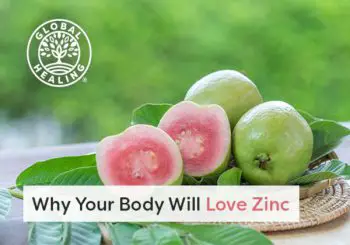Guest Writer for Wake Up World
It’s a fact that zinc is highly involved in the health of your body. Of all the 59 Trace Elements, Zinc participates in every activity of the human body. Even though zinc is a trace mineral, meaning that the body only needs small amounts, it is required for almost 100 enzymes to carry out vital chemical reactions. Zinc also plays an essential role in making DNA, growth of cells, building proteins, wound healing, blood clotting, thyroid function, and supporting a healthy immune system. Since zinc is not stored in your body, you can see why you need a good source of zinc daily.
[pro_ad_display_adzone id=”110028″]
Let’s talk about the significance of zinc and why it can be difficult to get enough. Minerals are the most significant deficiency on the planet due to our soils being depleted and sprayed. They are also at the heart of being cofactors for enzymes, making vitamins, like B-12, and making antioxidants and even phytonutrients. Zinc is one of the most widespread micronutrient deficiencies in crops and pastures worldwide and causes considerable losses in crop production and crop quality. Zinc’s primary function in the soil is to help plants make chlorophyll. Plant leaves can lose their normal color, and plant growth becomes stunted when soil is zinc deficient. Phytates (phytic acid) in whole grains, bran, rice, and corn also block zinc. So many things in today’s world can block a sufficient amount of zinc and cause zinc deficiency.
Estimates indicate that more than two billion people are zinc deficient. Zinc is considered the most known micronutrient deficiency and the fifth most important risk factor for disease in developing countries, which is likely due to it being challenging to get and maintain.
Cadmium, a very toxic metal, also inhibits zinc. If you have the proper amount of zinc in your body and then experience exposure to cadmium, there is less of a toxic effect. However, the opposite is also true — the less zinc you have, the more poisonous cadmium becomes. Also, taking an antacid, a Diuretic, or Statins can deplete your zinc, which means you quickly become zinc deficient.
Things That Can Hinder Your Absorption of Zinc:
Many foods and diseases can hinder zinc absorption. Some include:
- Tannins in tea
- Sulfites in wine
- Glyphosate from GMO foods
- Alcohol alone without sulfites
- Gastric bypass surgery
- Any digestive damage such as IBS, crohn’s, diverticulitis, liver disease, or cirrhosis
- Overuse of antibiotics
- Refined sugars
- Pancreatitis and pancreatic insufficiency
- Diabetes
As you age, you lose the concentration of stomach acids compared to what you used to have when you were younger. Stomach acid is needed to absorb zinc. The beauty of Global Healing’s Organic Plant-Based Zinc is that your stomach acids are not required for the body to absorb it because it is already in a digested state allowing the body to absorb it immediately. It’s also perfect for people with preexisting digestive issues like the ones I mentioned above. Remember, back in Dr. Norman Walker’s day, the soils weren’t as depleted, people weren’t eating as much refined sugar, grains, and GMO foods as they do today, and people weren’t on as many meds and antacids. Even though Dr. Norman Walker was described as a nutrient-calculating doctor genius who didn’t consume alcohol, eat processed or GMO foods, take medication, and have digestive issues, he still felt the need to take zinc every day. It is a simple trace mineral; taking it can prevent and potentially resolve many health issues.
Now let’s look at just a few of the possible issues resulting from Zinc Deficiency. Maybe a concern that you are having is listed below.
Immune System
Zinc is a critical component needed for your immune system. If you have an infection or are sick, you will most likely have a zinc deficiency because your immune system will use any zinc you have to fight the infection. Zinc can decrease the total time that the common cold lasts. If you can take zinc right at the beginning of a cold, you can considerably shorten the time.
One significant symptom of zinc deficiency is the loss of smell and taste. As I said above, when you get an infection, your immune system will use the zinc you have to fight off that infection. Consequently, a side effect of zinc deficiency could cause the loss of taste and smell. In my opinion, zinc is the best option to recover your smell and taste.
Our mast cells involve histamines, and asthma symptoms need zinc as their main mineral. Therefore, taking zinc can act as a natural antibiotic, a natural anti-inflammatory, and reduce inflammation and mucus. The superficial internal layer surrounding your airways is loaded with zinc, and you have all these mast cells waiting to deal with foreign particles, such as pollen. What’s even crazier is that certain fungi like candida grow with zinc and other minerals, which will steal your zinc and other minerals like manganese. When they steal your zinc and leave you deficient, they can survive better because they weaken your immune system resulting in an underlying battle between your immune system and microbes trying to snatch up and steal all the zinc.
Prostate
Let’s talk about the prostate for a minute. Zinc levels are much more significant in a normal prostate, whereas mild hypertrophy and chronic prostatitis in an enlarged prostate gland contain about 35% less zinc. And prostate cancer has an average of 70% less zinc than a normal prostate. A zinc deficiency can also lead to hypogonadism, resulting in smaller testicles and a smaller output of testosterone because zinc is needed to make testosterone. People with low testosterone are usually zinc deficient. Sperm is rich in zinc as well. Sperm travels through a tube into the prostate area, where other glands are located that produce fluid with the fluids of the prostate gland, all mixing into semen.
Brain
So we’ve looked at the prostate and the immune system. Now, look at the brain with mood, mental, and neurodevelopmental disorders.
Many clinical studies indicate that zinc can act as a natural antidepressant. Patients with major depressive disorders are almost always deficient in zinc. Why is this? When you lack zinc, the nerves of your nervous system begin to degenerate. There is a good amount of zinc concentration in the neurons around the amygdala and the hippocampus, which directly affect one’s mood. Dopamine, for example, binds to zinc, which is essential for memory, focus, and feeling good. Zinc is heavily involved in making proteins, and neurotransmitters are proteins. So if you have any depression or mood disorders concerns, you will find that zinc can significantly help you.
As we see, zinc is an essential mineral that plays a vital role in brain health. In a clinical study, children who experienced a deficiency of zinc can also present with ADHD symptoms like concerns with attention span, shakes, anxiety, and hindered cognitive development. Research also indicates that supplementing with zinc may only be effective in children with a high risk of zinc deficiency.
Skin
The third most zinc-abundant tissue in your entire body is zinc. If zinc is deficient, you can experience acne, eczema, cracked skin, fissured skin, rosacea, and many different types of dermatitis. A zinc deficiency can dry out the oil (sebum) in the skin and can lead to superficial and internal skin ulcers such as stomach ulcers, mouth ulcers, or even bed sores. One of the treatments suggested for many of these issues is skin creams containing zinc, such as diaper rash creams. Therefore we can say that zinc also acts as a natural anti-inflammatory.
As seen in research and a clinical study here, the highest zinc concentration in the human body is measured in the eye. Zinc deficiency has a dramatic effect on ocular development, primarily when it occurs during the early prenatal period. The study also indicates that it is well known that zinc deficiency causes functional damage in various parts of the eye. Age-Related Macular Degeneration and other eye issues are definite symptoms of zinc deficiency.
Inflammation
Zinc is an essential cofactor in some of the significant reactions in the body that help manage inflammation. When zinc is deficient, it can heighten the inflammatory response and, over time, cause damage to your body. Over time, a zinc deficiency can contribute to systemic inflammation and is possibly linked to impaired immune function often seen in older adults. Zinc supplementation in elderly adults indicates zinc can decrease the production of inflammatory cytokines, lower oxidative stress, and diminish the frequency and severity of infections.
The Bottom Line
Zinc is an essential mineral with many vital functions in the body. Zinc supports your immune function, keeps your prostate healthy, keeps your skin healthy, supports brain health, attenuates inflammation, and helps protect your eyes. Because your body cannot make its zinc, you need to get it through by implementing a healthy diet or complementing your diet with an organic, plant-based zinc supplement. Taking zinc supplements ensures you’re also getting enough copper (most adults need 1 milligram per day).
I highly suggest supplementing your diet with zinc, especially if you are not consuming foods that contain zinc. A perfect zinc supplement is Global Healing’s liquid Zinc supplement, made from organic guava leaves with Energized Trace Minerals™ to enhance absorption and optimize benefits. When deciding to take a supplement, be sure to do your research concerning the many different types of zinc supplements: They are not all created equal.







